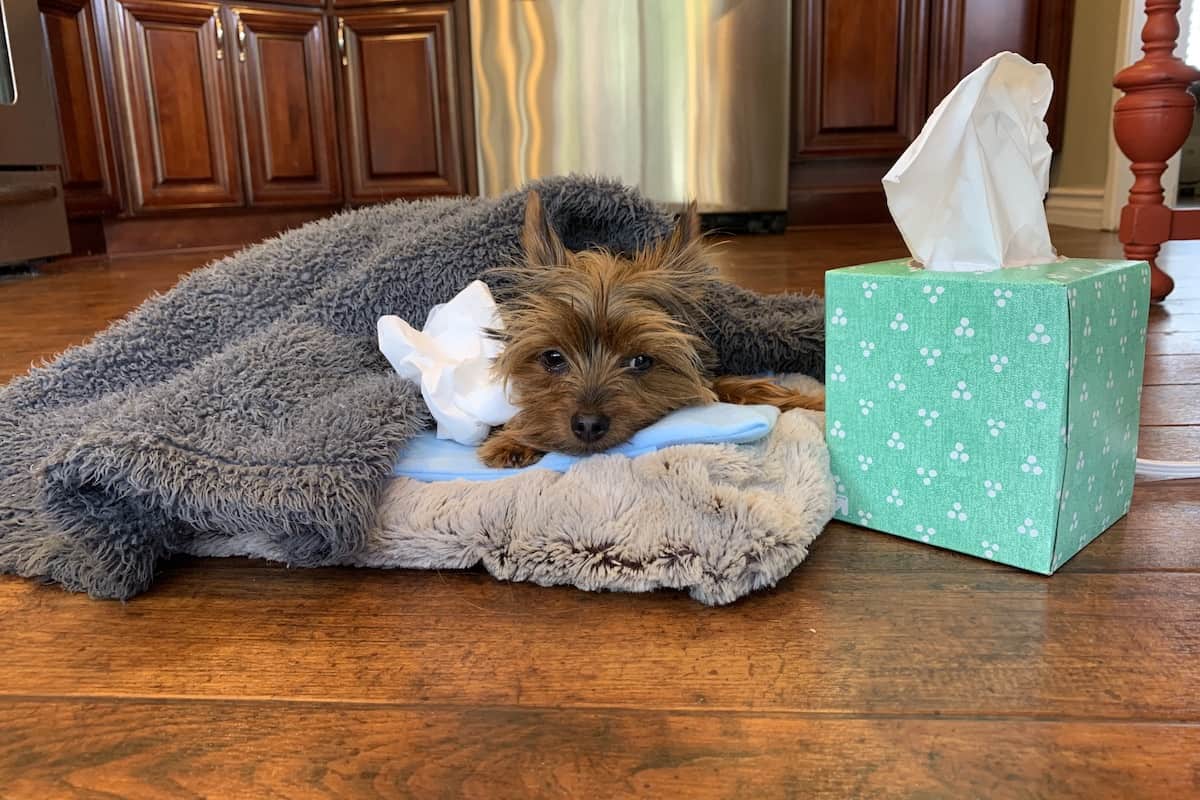The Dog Tale is reader-supported. We may earn a commission if you buy something through our site; this doesn’t change our recommendations.
If you think you are the only one suffering from allergies, think again. When allergy season rolls around, your animal friends can suffer, too, and Yorkshire Terriers are no exception.
While Yorkie allergy symptoms won’t always manifest in the same ways as human allergies, there are lots of signs you can watch for. Read on to learn more about what Yorkies are allergic to and ways to treat them.
In this guide:
- What are Yorkies allergic to?
- How to treat Yorkie allergies
- Use baby steps when treating Yorkie allergies
- References
Not what you were looking for? This article is about things your Yorkie may be allergic to. If you wanted to know if you can be allergic to Yorkies, go here: Are Yorkies Hypoallergenic?
What are Yorkies allergic to?
There’s a host of product ingredients and natural elements that your Yorkie may be allergic to. Here’s a rundown on everything you should keep your eye on if you suspect your Yorkie is having an allergic reaction.
Yorkies and chemical allergies
Some of the common cleaners you are using in your home right now may be causing Yorkie skin allergies. Many human products are not formulated for a dog’s skin pH level, and the American Veterinary Medical Association warns that many of the concentrated formula cleaners, solvents, and other household cleaners we use every day may cause contact irritation or worse.1
Read the labels of your cleaning products carefully and follow any directions that state “keep away from pets until dry.” Even better, consider using a pet-safe natural formula cleaner around the house.
If your Yorkie is suffering from skin irritation or seems to be sneezing or showing other signs of respiratory irritation, try to narrow down what new irritants they may have come into contact with over the past few days.
Did you just mop with a new cleaner or spray anything different on the countertops? Did your pup spend time in someone else’s home where they don’t normally play? You may be able to gather some clues as to what is causing issues for your four-legged friend.
As with all health issues, if you are unsure if your pup is experiencing something more serious than sneezes, take them to your vet to be safe. We’ll talk more about how to treat chemical allergies later in this guide.
- Protect your pet in seconds
- Accident & Illness + Optional Wellness coverage available
- Policies start at just $9.99/mo
>> Read more: Lemonade Pet Insurance Review
Yorkies and food allergies
Your dog probably doesn’t need a gluten-free, vegan diet to live their best life, but it’s totally possible that your cute little furball came with dietary restrictions of their own.
True food allergies in dogs are different than simple food intolerance or sensitivity. A food intolerance or food sensitivity would be comparable to lactose intolerance, and it typically causes problems for your pup like digestive irritation, gas, upset stomach, and diarrhea.
>> Learn more about what foods Yorkies can eat and what foods to avoid
A Yorkie food allergy will manifest itself in an immunological response and take the form of something similar to anaphylactic shock (like a serious nut allergy in a human). Food allergies in Yorkshire Terriers can cause more significant reactions like diarrhea, hives, swelling of the face or airway, and acute vomiting.
Every breed (and every dog) is different, but unfortunately, Yorkies are particularly prone to digestive issues, and it can be difficult to distinguish between food sensitivities and more serious food allergies and dog IBD. In either case, you’ll want to carefully monitor what your dog eats if you notice symptoms of allergies or intolerance, and work to identify and eliminate the cause as quickly as possible. You should also consult our guide on what to feed a dog with IBD.
If your dog demonstrates serious allergic symptoms, take them to a vet right away so they can test your pup to correct the problem.
>> Read more: What Vegetables Can Dogs Eat? Safe & Healthy Ingredient List
Yorkies and pollen allergies
Just like humans, Yorkies can have allergies to pollen, and we’re betting they hate it as much as you do. When the seasons turn and plants bloom, Yorkies can be pretty miserable, too.
Yorkie seasonal allergies won’t necessarily manifest the same way human allergies do. Yorkie allergy symptoms from pollen, for instance, most often include irritation at the site of contact. This means the face (especially the eyes and ears), paws, and other areas where the pollen becomes trapped in their fur will become inflamed and itchy.
Telltale signs of a Yorkie skin allergy related to pollen may be frequent chewing and licking of the paws and legs. As a result, scabbing and hair loss may occur at these sites, further irritating the skin.
Without treatment, this vicious cycle of irritation and chewing can go on and on, leaving a poor Yorkie in a pretty unhappy state.
How to treat Yorkie allergies
Yorkie allergies can be tricky to spot, but with some patience and occasionally some help from your vet, you should be able to help your pup live a comfortable life.
How to treat Yorkie chemical allergies
The basic trick to treating chemical-related allergies is to avoid the chemicals in the first place. Take stock of which cleaning chemicals you are using in your home and be careful to remove your pet from the area when cleaning. Follow any pet-related directions on the cleaner labels and keep your pet out of the area for 24 hours, or at least until the cleaner has dried.
An even better strategy is to use pet-safe, dye-free and fragrance-free cleaners. Several companies specialize in these products for your pets. Our favorite brand is Wondercide, which makes pup-safe cleaners and soaps using lots of natural ingredients and none of the nasty stuff.
If you’re concerned about chemicals irritating your dog’s skin, you may also want to try an all-natural, organic shampoo brand. Our guide to the best shampoo for Yorkies outlines all of your top options.
How to treat Yorkie food allergies
To identify a possible food allergen, the Clinical Nutrition team at Tufts University recommends trying a food elimination diet in which you systematically eliminate foods while strictly controlling your dog’s overall diet.2
Elimination diets can be a lengthy process, especially with notoriously picky eaters like Yorkies, so you will need to dive into it with a plan and lots of patience. However, if you can stick with it, you just might help narrow down the offending foods and give your pup some relief.
Avoiding low-quality foods and feeding your dog a diet with limited, natural ingredients may help as well. As an added bonus, a healthier diet will help improve a Yorkie’s immune system and make them more resilient, so giving your pup cleaner meals is a win-win. You can even get a human-grade dog food subscription if you want your pup to eat as well as you do!
Before making any radical changes to a Yorkie’s diet, be sure to consult with your vet, especially if your dog is a puppy or a senior. Rapid changes in diet can be a bit traumatic, especially on a smaller breed like the Yorkie, so swapping out the menu may need to be a gradual process.
>> Read more: Best Dog Food for Yorkies: Wet, Dry, Allergen-Friendly & More
How to treat Yorkie pollen allergies
For a dog, pollen can be a tough allergen to avoid. Since dogs use their nose and paws to interact with nearly everything around them, contact with pollen is almost inevitable.
If your Yorkie has pollen allergies, try to limit time outside during peak pollen seasons, and try to prevent contact with certain plants if you notice particularly bad reactions after your dog encounters them.
Also, after your pup has been outside, wipe them down with a damp cloth, paying extra attention to the paw pads, nose, eyes, rump, and anywhere else you see pollen accumulating.
Regularly bathing a Yorkie with a soothing Yorkie shampoo during allergy season may also help minimize your dog’s reaction to pollen.
Finally, If your pup’s skin is showing signs of pollen irritation, treat spots that have become inflamed with a natural hotspot spray that includes soothing colloidal oatmeal and vitamin E.
Use baby steps when treating Yorkie allergies
Unfortunately, nailing down exactly which allergy is afflicting your four-legged friend can be a tall order. None of these changes are going to bring overnight relief, and Yorkies with allergies can be a pitiful sight for pet parents. You’ll need lots of patience while searching for the culprit.
If you feel you’ve hit a wall, or if you are concerned about more serious issues, don’t hesitate to call your vet. They have seen it all when it comes to canine allergies and should be able to point you down the right path.
Most importantly, give the Yorkie in your life a balanced diet, lots of exercise, and pay extra attention to their overall health. A healthy dog will be more resilient and less dramatically impacted by allergies, so keep them active and happy!
>> Read more:
Pumpkin Pet Insurance Review
Let's bark a little
Get our latest updates and articles right in your email.
We won't bark too much. Promise.
23 Unhealthiest Dog Breeds: Which Have the Most Health Problems
Purebred vs Mutt: Are Mixed Breed Dogs Healthier?
Vaginitis in Dogs: Causes, Signs & Treatment
References
- (n.d.). Retrieved from https://www.avma.org/public/PetCare/Pages/householdhazards.aspx.
- Clinical Nutrition Team. (2019). What every pet owner should know about food allergies. [online] Clinical Nutrition Service at Cummings School. Available at: https://vetnutrition.tufts.edu/2017/01/food-allergies/ [Accessed 21 Oct. 2019].


